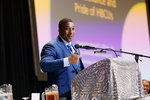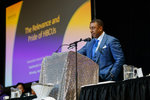

Fayetteville State University Chancellor Darrell Allison says had he not gotten a scholarship to N.C. Central University in Durham and a paid internship, chances are he would have returned home and been forced to work in the Kannapolis textile mills like his family before him.
It was the only full-paid scholarship he was offered, and it was the only way for him to avoid a life in the mills. That scholarship and his subsequent hard work in college led to much greater things.
Allison, the 12th chancellor in FSU’s long history, wove the solemn words of the civil rights leader during his keynote speech at the 29th Dr. Martin Luther King Jr. Prayer Brunch held Monday at the Crown Expo Center.
As he spoke of growing up in Kannapolis - a first-generation college attendee in his family and a child of low-income parents - a slide was presented on a large background screen that showed King's face and carried the following quote: “Whatever your life’s work is, do it well,” King said. “A man should do his job so well that the living, the dead and the unborn could do it no better.”
Approximately 700 people attended the event, which is a fundraiser for the faith-based Fayetteville/Cumberland County Ministerial Council. The event was rescheduled from January.
The scholarship opened things up for Allison, creating a domino effect that first brought on a paid internship in the White House during the Clinton administration.
“The school worked. And I did it. Diligent. Focused,” he said. “Then something interesting happened. It was the summer of my junior year.”
The newly hired chancellor at N.C. Central at the time was civil rights activist and educator Julius Chambers. “It was a big to-do,” Allison said.
“He didn’t know me. There was no reason to know me,” he told the audience.
Allison recalled getting ready to go to work in Salisbury when he got a phone call from the chancellor’s office. On behalf of the new chancellor, he was told, “I’ve got some good news to share with you.
“We have an opportunity for you. We’ve identified some of our leading scholars, students that have been doing very well. ‘Son, you have done a good job. Son, you had a 4.0 in your major. You are to be saluted.’ ”
To his surprise, the school and Chambers extended him an opportunity to intern over the summer at the White House.
“I froze,” he recalled.
The internship would come with pay.
It would make a huge difference in his life.
“That young man – the summer of 1993 – made it to the White House,” he said to applause.”I went to the personnel office. All kind of opportunities. Clinton administration. Fell in love with D.C. Finished North Carolina Central University. Went back to D.C. I worked for a couple of years for the Department of Justice under Janet Reno.’’
He would attend law school, and he worked on legislation policy at the U.S. Capitol.
“The doors just – WOW! I would not be here – without a shadow of a doubt – I would not be standing before you today,” said Allison. “My trajectory would not have been (the same) but for that. I have no doubt in my mind. That’s why it matters.”
Allison said Fayetteville State “needs to be recruiting. We must be retaining. But we must give the workforce – paid internship workforce and graduation. I know what it can do. That is what we’re moving toward.”
In terms of career, the chancellor said, academics is second to none. But part of the academics, he added, must be the workforce piece. The paid internships.
“Our academics matches with anybody. Chapel Hill. Duke. Etcetera. The other element to it has to be that our students can also be able to articulate their experience just like (students enrolled at) Carolina, Duke and others. So when they’re sitting with that employer, they not only can talk academics but they can talk the job experience, as well.”
This year, FSU’s goal was to have 100 paid internships for Fayetteville State by June 30, according to Allison.
“Well, I’m happy to report today – four months ahead of schedule – we have 105 paid internships at Fayetteville State University. By 2024, we’re going to reach at least 750 paid internships for Fayetteville State students.”
Those paid internships, he said, are the result of “the power of partnerships.”
As an example, Allison cited FujiFilm and Oliver Bradley, who is a Class of ‘87 FSU alumnus and former team member of the company.
“He wanted to explore the opportunity of perhaps an FSU student receiving a paid internship. And through much hard work,” he said, “we identified one.”
That student is 23-year-old Demarest Barnes.
Barnes received a paid internship with FujiFilm last July. Along the way, Barnes not only impressed Bradley but also the department manager for sight automation for FujiFilm.
So after starting with a paid internship, in November 2021, Barnes was offered a full-time position in automation engineering with a starting salary of $70,000.
“That’s what it’s all about,” the chancellor said. “He got the opportunity.”
Michael Futch covers Fayetteville and education for CityView TODAY. He can be reached at mfutch@cityviewnc.com. Have a news tip? Email news@CityViewTODAY.com.